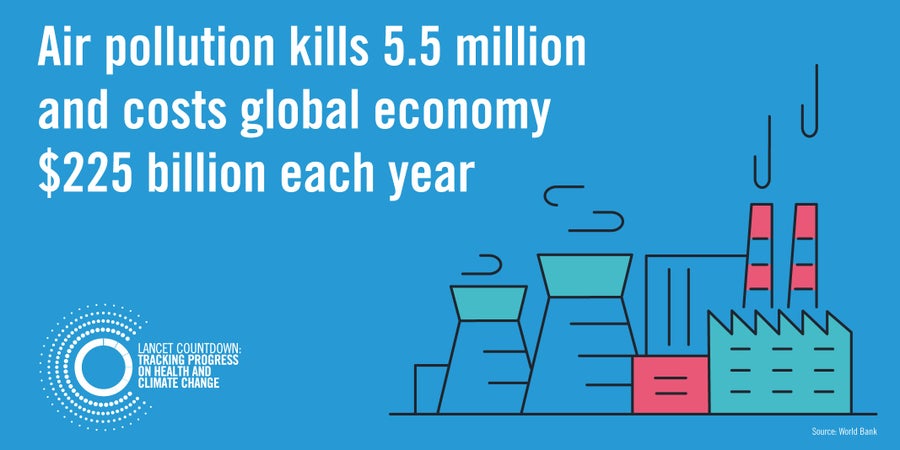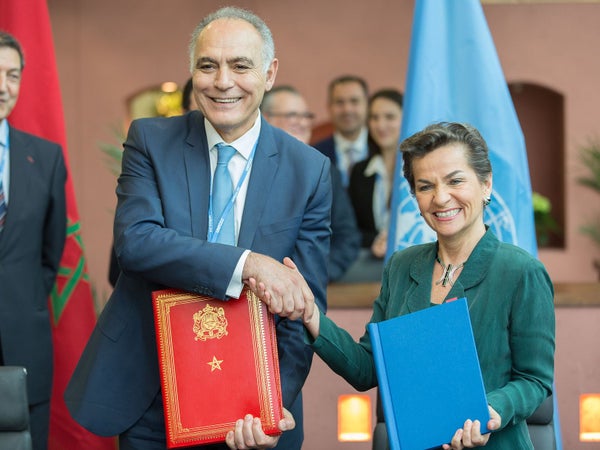This article was published in Scientific American’s former blog network and reflects the views of the author, not necessarily those of Scientific American
Today, a new initiative called “The Lancet Countdown: Tracking Progress on Health and Climate Change” was launched at the COP22 climate talks in Marrakesh. This multi-disciplinary research initiative brings together experts [1] from around the globe to track and analyze the impacts of climate change on public health.
The interrelation of climate change and public health is becoming increasingly well-known in the scientific and medical communities. Indeed, in a report published last year by The Lancet medical journal, researchers concluded that climate change represents “the greatest global health opportunity of the 21st century”. According to Patricia Espinosa, Executive Secretary of the UN Framework Convention on Climate Change:
“The health impacts of climate change are already being felt and effecting some of the most vulnerable on our planet. No one is immune or out of reach. Climate action, spearheaded by governments and supported by business, cities, investors and citizens – including health care professionals – goes hand-in-hand with delivering a better quality of life in its own right and as a key pillar of the Sustainable Development Goals.”
On supporting science journalism
If you're enjoying this article, consider supporting our award-winning journalism by subscribing. By purchasing a subscription you are helping to ensure the future of impactful stories about the discoveries and ideas shaping our world today.
The editor-in-chief of The Lancet medical journal, Dr. Richard Horton has states that policymakers and businesses need to be more aware of the huge health risks associated with climate change. According to Horton:
"One challenge of the ongoing global climate crisis is to convey the urgency of our collective predicament and the need for decisive action…The Lancet Countdown on Health and Climate Change is being launched today to amass the evidence needed to hold policymakers accountable for their promises and commitments. The research community can make an important contribution to heightening political awareness and accelerating progress to a healthier, low-carbon world."
In addition to collecting and publishing evidence related to the health impacts of climate change on public health, the newly launched Lancet Countdown will work to provide policymakers with a better understanding of climate health impacts and effective mitigation strategies. In this work, The Lancet Countdown anticipating tracking a set of key indicators across five themes:
the health impacts of climate hazards
health resilience and adaptation
health co-benefits of climate change mitigation
economics and finance
political and broader engagement
Within the co-benefits theme, the Countdown’s proposed indicators will focus on the health benefits that can be immediately realized through climate change mitigation – for example, through the reduction of air pollution. Here, researchers place heavy emphasis on the energy sector due to its leading role in the production of both greenhouse gases and other air pollutants. Overall, the energy sector produces about two-thirds of human-produced greenhouse gas emissions globally. It is also the main source of air pollution, producing almost all of global sulphur dioxide and nitrogen oxide emissions as well as around 85% of particulate matter.
Right now, this group is proposing to track global progress in:
the phase-out of coal
renewable energy use growth
clean energy access
increasing energy access for health facilities
reducing human exposure to ambient (outdoor) air pollution
the deployment of low-emission vehicles and access to public transport
active travel (i.e. walking, biking) infrastructure and uptake

Credit: Lancet Countdown
The work completed by the Lancet Countdown team [2] is intended to complement efforts by the Intergovernmental Panel on Climate Change (IPCC). It will also include a special collaboration with the World Health Organization (WHO) and the World Meteorological Organisation (WMO) to “promote synergies, collaborate on data sources, and ensure strong engagement with Ministries of Health” throughout the Countdown process. According to Dr. Nick Watts, Executive Director of The Lancet Countdown:
“The Lancet Countdown will prepare the evidence and data, tracking progress over the next 15 years. Importantly, it will build on this medical evidence to work with health professionals and health associations to empower them with the information they need to hold their Governments to account. The Lancet Countdown will also engage directly with health policymakers, to ensure that the responses to climate change are developed in a way that puts the heart, lungs, and health of the public front and centre.”
To learn more about The Lancet Countdown, one can read the full report about this work that was released today at: http://www.thelancet.com/journals/lancet/article/PIIS0140-6736(16)32124-9/fulltext
[1] the author of this post is a contributing researcher for The Lancet Countdown research initiative. She is also an author on the 2016 paper “The Lancet Countdown: tracking progress on health and climate change” as well as the 2015 Lancet Commission report “Health and climate change: policy responses to protect public health.”
[2] including participants from the following institutions:
Centre Virchow-Villermé
European Centre for Environment and Human Health
Imperial College London
International Livestock Research Institute
London School of Hygiene and Tropical Medicine
Sustainable Development Unit
The Centre for Climate & Security
The Grantham Institute
Tsinghua University
Umea University’s Centre for Global Health Research
United Nations University
University College London (the Energy Institute; and the Institutes of Global Health, for Sustainable Resources, for Human Health and Performance, and for Environmental Design and Engineering; the Departments of Geography, and of Science, Technology, Engineering and Public Policy; the Centre for Biodiversity and Environment Research)
University of Exeter
University of York
